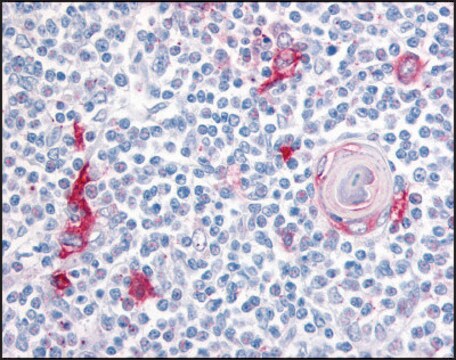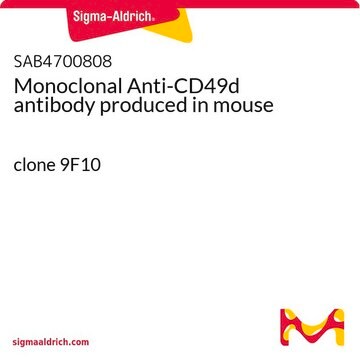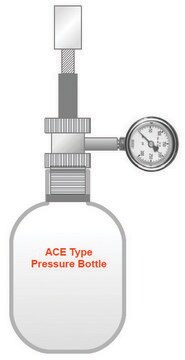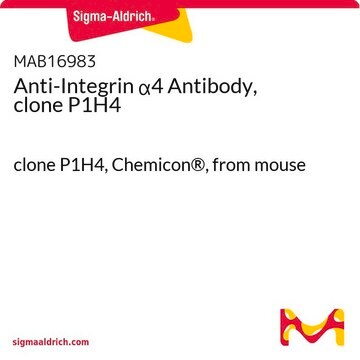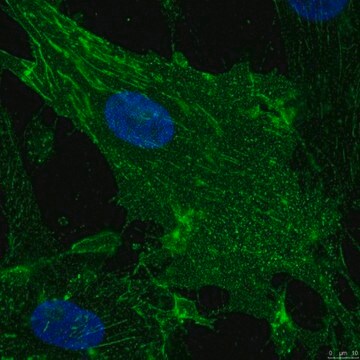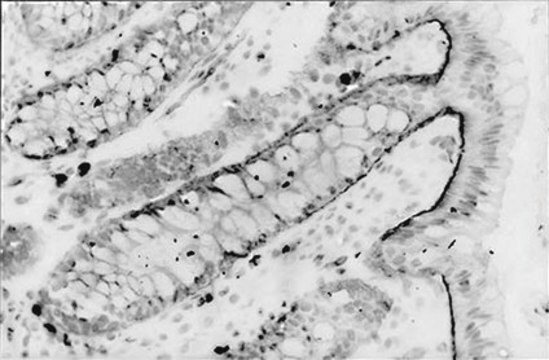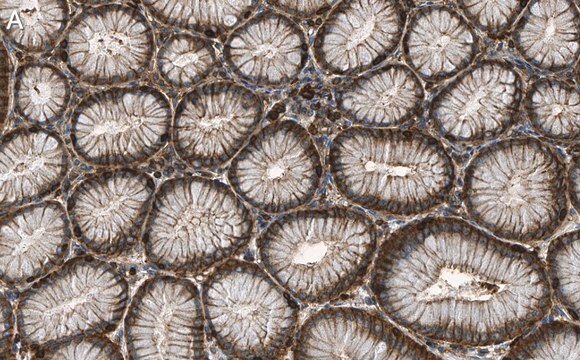ZRB1805
Anti-Integrin α4/CD49d Antibody, clone 1C21 ZooMAb® Rabbit Monoclonal

recombinant, expressed in HEK 293 cells
About This Item
IHC (p)
WB
immunohistochemistry (formalin-fixed, paraffin-embedded sections): suitable
western blot: suitable
Recommended Products
biological source
rabbit
Quality Level
recombinant
expressed in HEK 293 cells
conjugate
unconjugated
antibody form
purified antibody
antibody product type
primary antibodies
clone
1C21, recombinant monoclonal
description
1C21 Clone
product line
ZooMAb® learn more
form
lyophilized
mol wt
calculated mol wt 117.99 kDa
observed mol wt ~120 kDa
purified by
using Protein A
species reactivity
rat, mouse, human
species reactivity (predicted by homology)
monkey
packaging
antibody small pack of 25 μL
greener alternative product characteristics
Waste Prevention
Designing Safer Chemicals
Design for Energy Efficiency
Learn more about the Principles of Green Chemistry.
enhanced validation
recombinant expression
Learn more about Antibody Enhanced Validation
sustainability
Greener Alternative Product
technique(s)
immunocytochemistry: suitable
immunohistochemistry (formalin-fixed, paraffin-embedded sections): suitable
western blot: suitable
isotype
IgG
epitope sequence
C-terminal cytoplasmic domain
Protein ID accession no.
UniProt accession no.
greener alternative category
shipped in
ambient
storage temp.
2-8°C
target post-translational modification
unmodified
Gene Information
human ... ITGA4(3676)
General description
Specificity
Immunogen
Application
Evaluated by Western Blotting in MOLT4 cell lysate.
Western Blotting Analysis: A 1:3,000 dilution of this antibody detected Integrin 4/CD49d in MOLT4 cell lysate.
Tested applications
Western Blotting Analysis: A 1:3,000 dilution from a representative lot detected Integrin 4/CD49d in lysates from Jurkat cells and Human peripheral blood mononuclear cells (PBMC)..
Immunohistochemistry (Paraffin) Analysis: A 1:1,000 dilution from a representative lot detected Integrin 4/CD49d in mouse spleen and rat spleen tissue sections.
Immunocytochemistry Analysis: A 1:300 dilution from a representative lot detected Integrin 4/CD49d in Jurkat cells.
Note: Actual optimal working dilutions must be determined by end user as specimens, and experimental conditions may vary with the end user
Target description
Physical form
Reconstitution
Storage and Stability
Legal Information
Disclaimer
Not finding the right product?
Try our Product Selector Tool.
Storage Class Code
13 - Non Combustible Solids
WGK
WGK 1
Flash Point(F)
Not applicable
Flash Point(C)
Not applicable
Regulatory Listings
Regulatory Listings are mainly provided for chemical products. Only limited information can be provided here for non-chemical products. No entry means none of the components are listed. It is the user’s obligation to ensure the safe and legal use of the product.
JAN Code
ZRB1805-4X25UL:
ZRB1805-25UL:
Choose from one of the most recent versions:
Certificates of Analysis (COA)
Don't see the Right Version?
If you require a particular version, you can look up a specific certificate by the Lot or Batch number.
Already Own This Product?
Find documentation for the products that you have recently purchased in the Document Library.
Articles
Learn about the hallmarks of cancer and find reliable ZooMAb® recombinant antibodies to study them, conveniently organized by cancer hallmark.
Our team of scientists has experience in all areas of research including Life Science, Material Science, Chemical Synthesis, Chromatography, Analytical and many others.
Contact Technical Service